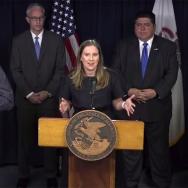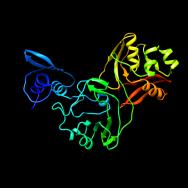As University of Chicago faculty, graduate students and postdocs scrambled to close on-campus research laboratories last week due to the spread of the novel coronavirus, Prof. Margaret Gardel knew she was running out of time.
“I had this increasing feeling that we weren’t going to come back, so I decided I’d have to do something,” said Gardel, who directs the NSF-funded Materials Research Center on campus that is now temporarily closed. But she knew her lab had something valuable for those working on the front lines at UChicago Medicine: personal protective equipment.
She also knew that it wasn’t just her lab that might have these items—including N95 face masks, face shields, gowns, surgical gloves and boot covers—so fiercely needed by health care workers both at UCM and around the country during the COVID-19 pandemic.
With the help of a colleague at Harvard University, Gardel developed a list of items, created a makeshift donation website and sent out an email to about 40 UChicago faculty across the Physical Sciences Division and the Pritzker School of Molecular Engineering.
Provost Ka Yee C. Lee helped connect the effort to the Biological Sciences Division and UChicago Medicine, and the donation effort took off.
“It happened really quickly, this incredible flurry of emails between a number of people,” said Marsha Rosner, a professor in cancer biology. “Everyone felt the urgency, and it was just this swell of effort… it was an amazing response that reflects the desire of so many people to do something to help out.”
By Monday, 3,500 surgical masks, 700 N95 face masks, 100 face shields, 280 gowns/coveralls, 830 boxes of gloves, 172 pairs of safety goggles and 150 boot covers had been donated from the collaborative effort.
Gardel, who organized the effort from her home, gave credit to all involved, notably her on-site lab manager, Yvonne Beckham, as well as the graduate students, postdocs and other coordinators from across the University, including Joy Bergelson (ecology and evolution) and Tobin Sosnick (biochemistry).
As the donations quickly overflowed Gardel’s lab, UChicago staff members took on the monumental task of intake and storage of the items at the Knapp Center for Biomedical Discovery.
“Everybody just jumped at the chance to donate supplies, which is a good thing, because we need it, but the pace of the stuff coming in was way more than I anticipated,” said Dan Tiberi, the building manager for the Knapp Center, who had to resort to filling up the former café in the building. “Before I knew it, within a couple of minutes, the phone would not stop ringing, and the emails just started flying in.
“I didn’t really have a plan or the manpower, but we managed. My team stepped up, and I applaud them.”
While the donations were appreciated and will aid UChicago Medicine’s efforts, Gardel and many other of the researchers know there will be more to do, and there are more collaborative efforts underway to try to solve for the ongoing critical shortage of personal protective equipment and the other very complex problems that the pandemic has presented.
“There’s so much need,” Gardel said. “The point is, we all have people in our lives who are on the front lines, and we just want to help out.”
Personal protective equipment and other donations are still greatly needed at all health care facilities across the country. University of Chicago Medicine has issued guidelines on what supplies are needed as well as how to donate them. Questions about donations or drop instructions can be emailed to covid-donations@uchospitals.edu.

